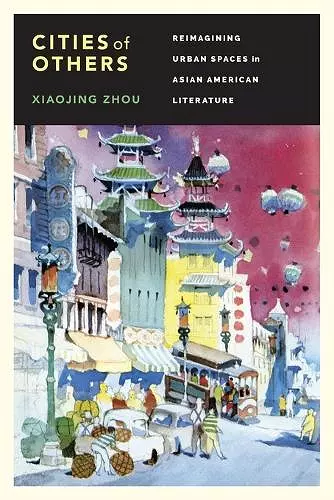Cities of Others
Reimagining Urban Spaces in Asian American Literature
Format:Paperback
Publisher:University of Washington Press
Published:1st Dec '14
Currently unavailable, and unfortunately no date known when it will be back

No other book has provided as sustained and wide-ranging a discussion on figures of urban space in Asian American literature. -- Juliana Chang, author of Inhuman Citizenship: Traumatic Enjoyment and Asian American Literature Opens up a new area for discussion in Asian American writing and moves criticism on Asian American literature into a dialogue with the issues germane to contemporary American fiction in general. -- Rocio G. Davis, author of Relative Histories: Mediating History in Asian American Family Memoirs
Asian American literature abounds with complex depictions of American cities as spaces that reinforce racial segregation and prevent interactions across boundaries of race, culture, class, and gender. This book provides the comprehensive examination to date of how Asian American writers - both celebrated and overlooked - depict urban settings.
Asian American literature abounds with complex depictions of American cities as spaces that reinforce racial segregation and prevent interactions across boundaries of race, culture, class, and gender. However, in Cities of Others, Xiaojing Zhou uncovers a much different narrative, providing the most comprehensive examination to date of how Asian American writers - both celebrated and overlooked - depict urban settings. Zhou goes beyond examining popular portrayals of Chinatowns by paying equal attention to life in other parts of the city. Her innovative and wide-ranging approach sheds new light on the works of Chinese, Filipino, Indian, Japanese, Korean, and Vietnamese American writers who bear witness to a variety of urban experiences and reimagine the American city as other than a segregated nation-space.
Drawing on critical theories on space from urban geography, ecocriticism, and postcolonial studies, Zhou shows how spatial organization shapes identity in the works of Sui Sin Far, Bienvenido Santos, Meena Alexander, Frank Chin, Chang-rae Lee, Karen Tei Yamashita, and others. She also shows how the everyday practices of Asian American communities challenge racial segregation, reshape urban spaces, and redefine the identity of the American city. From a reimagining of the nineteenth-century flaneur figure in an Asian American context to providing a framework that allows readers to see ethnic enclaves and American cities as mutually constitutive and transformative, Zhou gives us a provocative new way to understand some of the most important works of Asian American literature.
"Zhou expands the intellectual horizon by moving beyond the critique of ethnic enclave as simply space of marginalization and by arguing that Chinatown mutually constitutes and transforms the US city and provides an alternative space for Asian American everyday practice as well as reimagining of a national subject. . . . Highly recommended."
* Choice *"Zhou tracks how authors such as Sui Sin Far, Lin Yutang, Fae Myenne Ng, and Frank Chin render alienated Asian immigrant characters as immersed in a series of urban interactions that on one level resists social marginalization and isolation and on another level imagines a sense of belonging, enacting a spatial citizenship and transforming the contours of being American... Zhou’s more ambitious aim is to show how Asian American literature reimagines and re-represents the American city... The close readings of novels are comprehensive and insightful."
* American LiteratuISBN: 9780295994031
Dimensions: unknown
Weight: 499g
344 pages